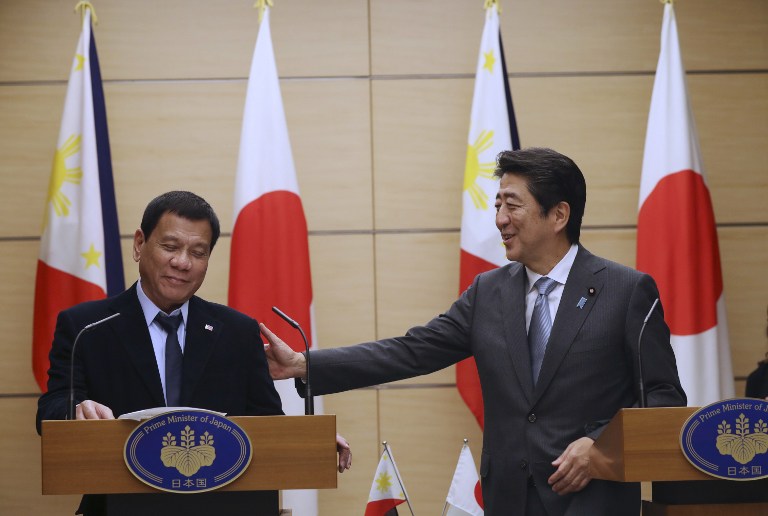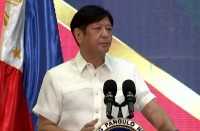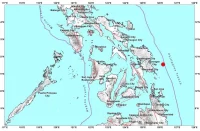
/ AFP PHOTO / AP POOL / Eugene Hoshiko
(Eagle News) — President Rodrigo Duterte came back Thursday night (October 27) from his successful three-day working visit to Japan, saying that the Philippine-Japan ties are “excellent” and would even be brought to a higher level by his visit.
“By all accounts and by any measure, Philippines Japan ties today are excellent and we agreed that we can take things to a higher level by harnessing our respective strengths and using these so both countries can have their economic strength further grow,” he said in his arrival speech where he stuck to reading his statement.
The President announced how his visit was “another defining moment” for the strengthening of Philippines—Japan ties.
Duterte said Japan will play a key role in modernizing the country’s maritime and air security, as well as in developing the economy.
Japan announced loans totaling 21.3 billion yen ($204 million) to help improve the Philippines’ maritime safety as well promote peace and agriculture on Mindanao.
“Japan will play a vital role in modernizing the Philippines’ capacities as a nation with maritime interests to protect. The acquisition of maritime and air capability assets are crucial in addressing traditional and emerging threats to our nations, including piracy, criminality at sea and terrorism, as well as in responding to disasters,” Duterte said in his arrival speech at the Davao International Airport.
Japan has also vowed to further help boost the country’s economy through investments in manufacturing and agriculture, and through official development assistance (ODA). The President said Japan was the country’s number one ODA partner.
He said Japan even supported the peace initiatives of the country, especially in Mindanao.
–Japan, a “true friend” —
Because of its continued help to the country, Duterte described Japan as a “true friend.”
“In all my interactions in Japan, it was clear to me and to everyone that Japan is and will always be a true friend of the Philippines,” the President said.
He said the Philippine-Japan relations “stands on unshaken and firm ground cemented by our mutual trust and confidence.”
The Philippines and Japan relations can be best viewed as an exemplary partnership that can only gain greater strength in the years to come,” he said.
“These are the relations that we value as we seek to implement an independent foreign policy, consistent with our Constitution, protective of our national interest and beneficial to our people,” the President added.
The President has admitted that he and Japan’s Prime Minister Shinzo Abe talked about the United States, but he said that they agreed to keep this confidential.
While the President was open with joint maritime cooperation with Japan, he was insistent on limiting US military presence in the country.
“I discussed with Prime Minister Shinzo Abe, in full detail, the state of Philippines-Japan ties and we identified terms of collaboration that would lead to a common path towards the achievement of shared objectives,” he said.
He said the meetings were “productive,” and covered economic, social, political, security issues.
–Freedom of navigation at South China Sea –
He said the Philippines and Japan have agreed to work closely “to advance a rules-based region to maintain stability and security in our region”
“Everyone in our region and beyond has a stake in the South China Sea,” he said.
The President said ‘both governments committed to ensure the a freedom of navigation and overflight in these waters.”
“We have a bilateral and multilateral venues that are at our disposal to ensure that commitments and responsibilities are complied with under international law, including the 1982 unclos,” he said, referring to the United Nations Convention on the Law of the Sea.







